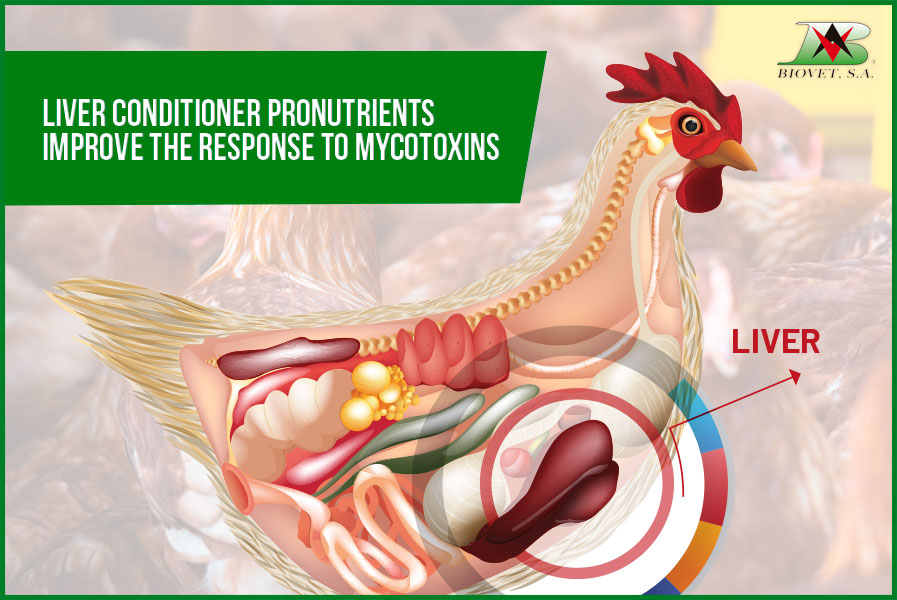Liver conditioner pronutrients improve the response to mycotoxins

Biovet S.A. has conducted an in vitro trial that evaluate the molecular mechanisms of liver conditioner pronutrients.
Recently, Biovet S.A. conducted an in vitro trial in collaboration with a biotechnological laboratory in Spain. The study aimed to discover the molecular mechanisms by which liver conditioner pronutrients (Alquernat Livol) have a regenerative effect on liver cells that have been damaged by aflatoxin B1.
Aflatoxin B1 (AFB1) is a mycotoxin produced by the fungus Aspergillus flavus and is one of the most potent hepatotoxic and carcinogenic substances. In addition, AFB1 has been found to intercalate into DNA and induce mutations in the P56 gene, interfering with DNA-polymerase and RNA-polymerase activities. This effect on the genetic material induces a decrease in RNAm and protein synthesis.
On the other hand, pronutrients are molecules of botanical origin that, through a metagenetic mechanism of action, produce the activation of a target cell and induce an increase in the translation of RNA into specific functional proteins. For this Biovet in vitro study, the target cell was hepatocytes.
The in vitro study was performed in 24 wells, where 1.2×105cells/ml were added in a final volume of 2 ml per well. After 4 days of culture, the confluence was observed, and the medium was replaced with different supplements. The study was divided into four treatment groups (positive control, negative control, with a challenge, with challenge + pronutrients). Challenge was done with aflatoxin B1 and puromycin, while the liver conditioner pronutrient used was Alquernat Livol.
Biovet’s in vitro study used the SUnSET technique.
To assess the effect of pronutrients on the mRNA-protein translation rate, a technique called SUnSET (Surface Sensing of Translation) was used.
The SUnSET technique is a non-radioactive method for monitoring protein synthesis in cell populations, based on the use of puromycin. Puromycin is a tyrosyl-tRNA analog that can be incorporated into newly synthesized proteins via peptide binding. Thanks to this, the detection of puromycin by an anti-puromycin antibody (a technique called ELISA Western Blot) can be correlated with the mRNA-protein translation rate.
Liver conditioners pronutrients have favorable results
In this in vitro study conducted by Biovet S.A., it was found that treatment including Alquernat Livol generated an increased protein synthesis in cells damaged by aflatoxin B1. These results were evaluated by the ELISA Western Blot technique. This effect is positive since it evidences the increase of protein synthesis in the affected hepatocytes, which is related to a better regeneration of these cells.
Thus, liver conditioner pronutrients such as Alquernat Livol have an inducing effect on the rate of mRNA-protein translation. This beneficial effect is related to the better production of tissue-specific proteins that favor organ repair when pathological damage is produced.
